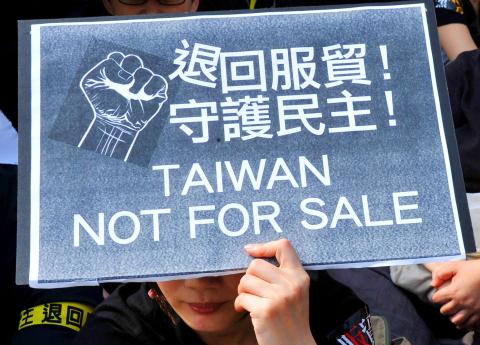As a student-led protest against the government’s handling of the cross-strait service trade agreement continues, the Ministry of Economic Affairs (MOEA) is planning to hold presentations at universities to explain to students the government’s views on the controversial accord.
Vice Minister of Economic Affairs Woody Duh (杜紫軍) is to head a team assigned to address the pact at schools, with his maiden show scheduled to take place at National Chengchi University today, followed by a second presentation at National Taipei University tomorrow.
During the presentations, Duh will explain what the services trade accord is, its contents and why it was signed, the ministry said.

Photo: Mandy cheng, AFP
Duh said he will also detail the signing process, which took place in June last year, and the pact’s legislative review and ratification process.
To avoid possible criticism blasting the presentations as nothing more than government propaganda, he will be open to questions, Duh said, adding that he is ready for any “thorny” questions.
It will be the ministry’s first presentation of the trade pact on campuses since the start of protests against the government’s handling of the accord on March 18 after Chinese Nationalist Party (KMT) lawmakers tried to fast-track it and put it to a full vote on the legislative floor, bypassing the review process.
The protest has since been expanded to an occupation of the Legislative Yuan by student protesters.
Concerned that the agreement, under which the two sides agree to open up to each other’s service sectors, would hurt Taiwan’s businesses and job market, protesters are demanding new legislation that would subject any cross-strait agreement to close monitoring by legislators and that lawmakers refrain from taking any action on the pact until the new law is enacted.
The ministry said that on Aug. 9 last year, it mailed 454 law, economics and finance departments and institutes at universities around the nation, asking if they wanted to have the government’s presentation of the services pact organized on their campuses.
However, most schools, including National Taiwan University and National Tsing Hua University, showed a lack of interest in the proposal, it said.
In other developments, the Formosa Plastics Group (FPG) responded positively to President Ma Ying-jeou’s (馬英九) press conference on Saturday addressing student protesters’ demands over the service trade pact and called for its quick passage through the legislature to help Taiwan gain greater access to the global economic community.
FPG said Ma gave clear explanations to assuage the doubts of the protesters and the public about the pact and cited central bank Governor Perng Fai-nan (彭淮南) as saying that “signing free-trade agreements always involves some give and take.”
If the agreement fails to clear the Legislative Yuan, Taiwan will not be able to conclude its negotiations on the largely completed goods trade agreement, which FPG said would hamper the nation’s efforts to join the proposed Trans Pacific Partnership and the Regional Comprehensive Economic Partnership.
Should this be the case, it will be extremely difficult for Taiwanese manufacturing businesses that are already squeezed by slim profit margins to survive, the group said.
FPG, one of Taiwan’s largest conglomerates with diverse interests, also urged the government to help tide businesses affected by the pact until progress is made.

Alain Robert, known as the "French Spider-Man," praised Alex Honnold as exceptionally well-prepared after the US climber completed a free solo ascent of Taipei 101 yesterday. Robert said Honnold's ascent of the 508m-tall skyscraper in just more than one-and-a-half hours without using safety ropes or equipment was a remarkable achievement. "This is my life," he said in an interview conducted in French, adding that he liked the feeling of being "on the edge of danger." The 63-year-old Frenchman climbed Taipei 101 using ropes in December 2004, taking about four hours to reach the top. On a one-to-10 scale of difficulty, Robert said Taipei 101

Taiwanese and US defense groups are collaborating to introduce deployable, semi-autonomous manufacturing systems for drones and components in a boost to the nation’s supply chain resilience. Taiwan’s G-Tech Optroelectronics Corp subsidiary GTOC and the US’ Aerkomm Inc on Friday announced an agreement with fellow US-based Firestorm Lab to adopt the latter’s xCell, a technology featuring 3D printers fitted in 6.1m container units. The systems enable aerial platforms and parts to be produced in high volumes from dispersed nodes capable of rapid redeployment, to minimize the risk of enemy strikes and to meet field requirements, they said. Firestorm chief technology officer Ian Muceus said

MORE FALL: An investigation into one of Xi’s key cronies, part of a broader ‘anti-corruption’ drive, indicates that he might have a deep distrust in the military, an expert said China’s latest military purge underscores systemic risks in its shift from collective leadership to sole rule under Chinese President Xi Jinping (習近平), and could disrupt its chain of command and military capabilities, a national security official said yesterday. If decisionmaking within the Chinese Communist Party has become “irrational” under one-man rule, the Taiwan Strait and the regional situation must be approached with extreme caution, given unforeseen risks, they added. The anonymous official made the remarks as China’s Central Military Commission Vice Chairman Zhang Youxia (張又俠) and Joint Staff Department Chief of Staff Liu Zhenli (劉振立) were reportedly being investigated for suspected “serious

American climber Alex Honnold is to attempt a free climb of Taipei 101 today at 9am, with traffic closures around the skyscraper. To accommodate the climb attempt and filming, the Taipei Department of Transportation said traffic controls would be enforced around the Taipei 101 area. If weather conditions delay the climb, the restrictions would be pushed back to tomorrow. Traffic controls would be in place today from 7am to 11am around the Taipei 101 area, the department said. Songzhi Road would be fully closed in both directions between Songlian Road and Xinyi Road Sec 5, it said, adding that bidirectional traffic controls would